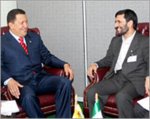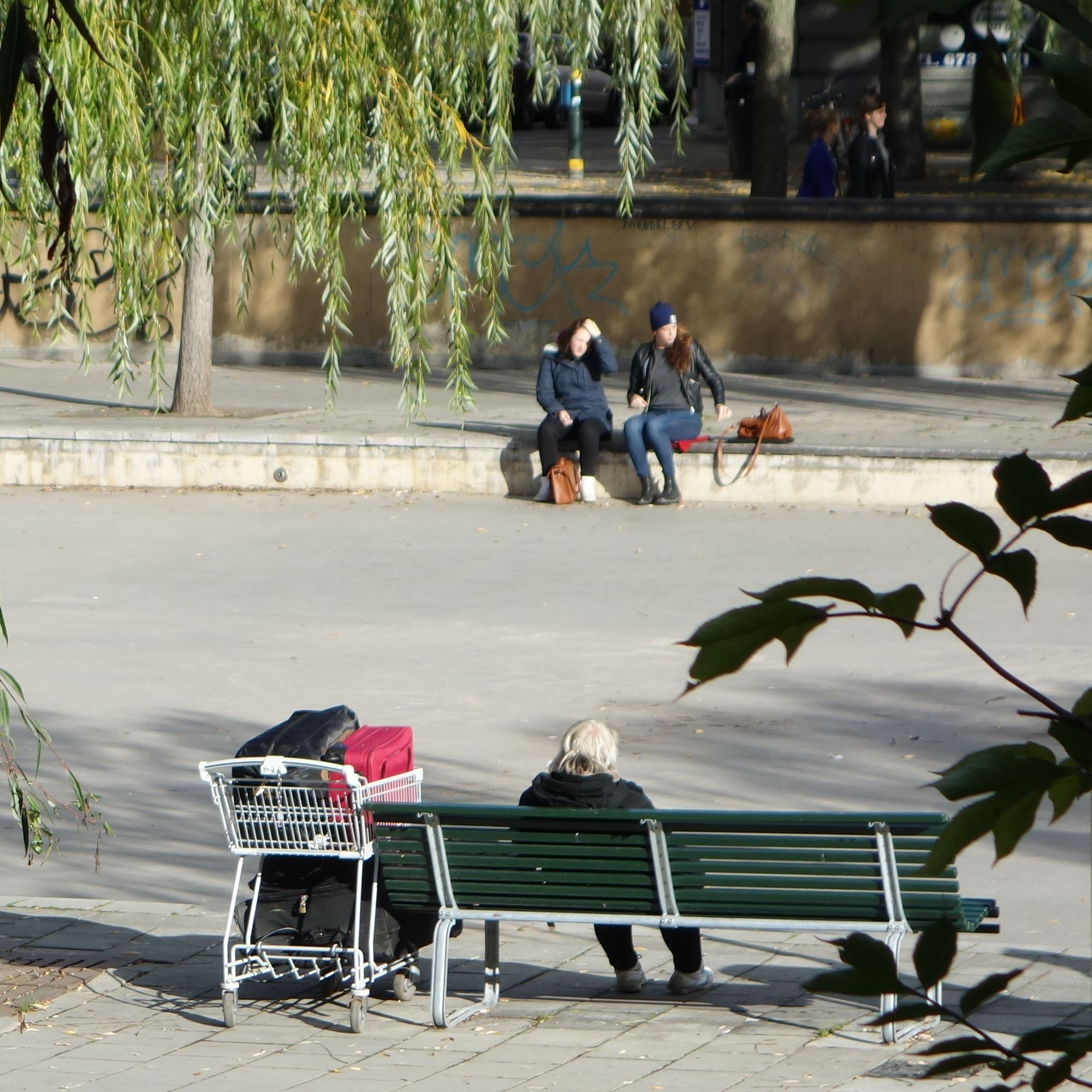
Hugo Chávez
Talet inför FN:s Generalförsamling
19 sept 2006

Hugo Chávez tal 18 dec 2009 i Köpenhamn | Hugo Chávez saknad
President Hugo Chávez,
Address to the United Nations
Tal hållet 2006 09 19
Representatives of the governments of the world, good
morning to all of you.
First of all, I would like to invite you, very
respectfully, to those who have not read this book, to
read it.
Noam Chomsky, one of the most prestigious American and world intellectuals, Noam Chomsky, and this is one of his most recent books, 'Hegemony or Survival: The Imperialist Strategy of the United States. '"
[Holds up book, waves it in front of General Assembly.]
"It's an excellent book to help us understand what has been happening in the world throughout the 20th century, and what's happening now, and the greatest threat looming over our planet.
The hegemonic pretensions of the American empire are
placing at risk the very survival of the human species.
We continue to warn you about this danger and we appeal
to the people of the United States and the world to
halt this threat, which is like a sword hanging over
our heads. I had considered reading from this book,
but, for the sake of time," [flips through the
pages, which are numerous] "I will just leave it
as a recommendation. It reads easily, it is a very good
book, I'm sure Madame [President] you are familiar
with it. It appears in English, in Russian, in Arabic,
in German. I think that the first people who should
read this book are our brothers and sisters in the
United States, because their threat is right in their
own house. The devil is right at home. The devil, the
devil himself, is right in the house.
"And the devil came here yesterday. Yesterday the devil came here. Right here."[crosses himself]
"And it smells of sulfur still today. Yesterday,
ladies and gentlemen, from this rostrum, the president
of the United States, the gentleman to whom I refer as
the devil, came here, talking as if he owned the world.
Truly. As the owner of the world. I think we could call
a psychiatrist to analyze yesterday's statement
made by the president of the United States. As the
spokesman of imperialism, he came to share his
nostrums, to try to preserve the current pattern of
domination, exploitation and pillage of the peoples of
the world. An Alfred Hitchcock movie could use it as a
scenario. I would even propose a title: "The
Devil's Recipe."
As Chomsky says here, clearly and in depth, the
American empire is doing all it can to consolidate its
system of domination. And we cannot allow them to do
that. We cannot allow world dictatorship to be
consolidated. The world parent's statement --
cynical, hypocritical, full of this imperial hypocrisy
from the need they have to control everything. They say
they want to impose a democratic model. But that's
their democratic model. It's the false democracy of
elites, and, I would say, a very original democracy
that's imposed by weapons and bombs and firing
weapons. What a strange democracy. Aristotle might not
recognize it or others who are at the root of
democracy.
What type of democracy do you impose with marines and
bombs?
The president of the United States, yesterday, said to
us, right here, in this room, and I'm quoting,
"Anywhere you look, you hear extremists telling
you can escape from poverty and recover your dignity
through violence, terror and martyrdom." Wherever
he looks, he sees extremists. And you, my brother -- he
looks at your color, and he says, oh, there's an
extremist. Evo Morales, the worthy president of
Bolivia, looks like an extremist to him. The
imperialists see extremists everywhere. It's not
that we are extremists. It's that the world is
waking up. It's waking up all over. And people are
standing up.
I have the feeling, dear world dictator, that you are
going to live the rest of your days as a nightmare
because the rest of us are standing up, all those who
are rising up against American imperialism, who are
shouting for equality, for respect, for the sovereignty
of nations. Yes, you can call us extremists, but we are
rising up against the empire, against the model of
domination. The president then -- and this he said
himself, he said: "I have come to speak directly
to the populations in the Middle East, to tell them
that my country wants peace."
That's true.
If we walk in the streets of the Bronx, if we walk
around New York, Washington, San Diego, in any city,
San Antonio, San Francisco, and we ask individuals, the
citizens of the United States, what does this country
want? Does it want peace? They'll say yes. But the
government doesn't want peace. The government of
the United States doesn't want peace. It wants to
exploit its system of exploitation, of pillage, of
hegemony through war. It wants peace. But what's
happening in Iraq? What happened in Lebanon? In
Palestine? What's happening? What's happened
over the last 100 years in Latin America and in the
world? And now threatening Venezuela -- new threats
against Venezuela, against Iran? He spoke to the people
of Lebanon. Many of you, he said, have seen how your
homes and communities were caught in the crossfire. How
cynical can you get? What a capacity to lie
shamefacedly. The bombs in Beirut with millimetric
precision? This is crossfire? He's thinking of a
western, when people would shoot from the hip and
somebody would be caught in the crossfire. This is
imperialist, fascist, assassin, genocidal, the empire
and Israel firing on the people of Palestine and
Lebanon. That is what happened. And now we hear,
"We're suffering because we see homes
destroyed.'
The president of the United States came to talk to the
peoples -- to the peoples of the world. He came to say
-- I brought some documents with me, because this
morning I was reading some statements, and I see that
he talked to the people of Afghanistan, the people of
Lebanon, the people of Iran. And he addressed all these
peoples directly.
And you can wonder, just as the president of the United
States addresses those peoples of the world, what would
those peoples of the world tell him if they were given
the floor? What would they have to say?
And I think I have some inkling of what the peoples of
the south, the oppressed people think. They would say,
"Yankee imperialist, go home." I think that
is what those people would say if they were given the
microphone and if they could speak with one voice to
the American imperialists.
[ . . . ]
And maybe we have to change location. Maybe we have to put the United Nations somewhere else; maybe a city of the south. We've proposed Venezuela.
You know that my personal doctor had to stay in the
plane. The chief of security had to be left in a locked
plane. Neither of these gentlemen was allowed to arrive
and attend the U.N. meeting. This is another abuse and
another abuse of power on the part of the Devil. It
smells of sulfur here, but God is with us and I embrace
you all.
May God bless us all. Good day to you.
Hugo Chávez is a self-made man. He
wasn’t piggy-backed into Harvard on a legacy
grant (Affirmative Action for plutocrats) or shoehorned
into the White House by corporate gangsters. He grew up
in a two-room thatched palm-leaf house with his five
siblings and dreamt of moving to New York to play
baseball for the Yankees. At age 18 he chose to make
the most of his meager opportunities by enlisting in
the military.
For 17 years, Chávez served his country;
gradually moving up the chain of command to lieutenant
colonel. Unlike his American counterpart, GW Bush,
Chavez never went AWOL during wartime or stumbled
through years of idle profligacy peering at the world
through beer-goggles.
While Bush was busy driving three consecutive companies
into insolvency and fattening his bank account with the
loot from insider-trading scams, Chávez was
putting together the Revolutionary Bolivarian Movement;
a leftist political organization which promoted
redistribution and civil rights.
Chávez was lifted to the presidency on the backs
of peasants and working-class people while Bush was
selected by 5 venal judges who repealed the democratic
process and suspended the counting of ballots.
The differences between the two men go on and
on. It is an interesting study in contrasts and one
that is particularly relevant to the deteriorating
state of world affairs.



